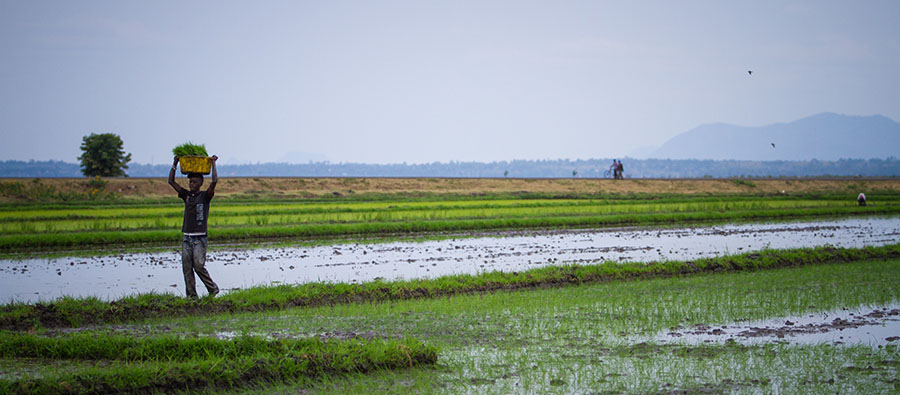United Nations member countries in 2015 adopted a Sustainable Development Agenda titled “17 Goals to Transform Our World, to end poverty, protect the planet and ensure prosperity for all.
And that, of course, is a tall order. Ours is a world of moving targets, a dynamic and rapidly changing environment in which technology, population growth, urbanization and climate change are fast altering the long-established order of things.
These changes affect every country on the planet. And when such changes carry negative effects, they have the power to disrupt national economies, threaten livelihoods, erase nations, and create a whole new class of refugees.
Fortunately, the success of the human race traces to our ability to adapt. And we will need to adapt quickly and often—perhaps more than ever before—if we hope to achieve the U.N.’s sustainable development objectives. And much of that adaptation will need to occur at the very foundation of civilization—agriculture.
Those who crafted the Agenda clearly recognize agriculture’s central role in the sustainability blueprint. Many of its goals—particularly those relating to zero hunger, responsible consumption and production, climate change and water access – are closely related to the practice and effects of agriculture.
This is familiar ground for us. We work with an international non-profit organization —Cultivating New Frontiers in Agriculture (CNFA)—which engages with smallholder farmers and small rural businesses all over the world, helping them to improve their livelihoods and stimulate economic growth in their communities through entrepreneurship.
We have seen the success of this strategy up close. CNFA’s private-sector-based, entrepreneurial approach to agriculture allows people in the world’s most challenged rural farming communities—those with limited household assets, few economic opportunities, and marginal productivity in agriculture—to share in community-based solutions that give them access to flexible, sustainable agricultural and business practices that they can use to improve their lives, as well as respond to the new challenges posed by population growth and climate change.
We believe that nonprofit organizations must increase their efforts to build resilience into critical systems like agriculture. Agriculture in particular is central to the well-being and livelihoods of the world’s rural populations.
But we must do more than simply build resilience to current challenges. Resilient systems must be designed to allow populations to take the reins, make decisions that serve their specific needs, and adapt in the future to conform to new, emerging requirements. This is necessary because the world is not a static place. What works in response to today’s issues may not work tomorrow.
This will require a shift in the way the development community approaches resilience. We need to acknowledge that, despite our best estimates and models, nobody is quite sure exactly what future conditions will be. That means we must move away from approaches that focus too much on preparing communities to endure short-term difficulties, and toward those which build the capacity of local populations not only to survive short-term shocks, but also to adapt to major new challenges that are sure to come.
We at CNFA support resilience by articulating and implementing approaches that meet a community’s present needs. But we also incorporate in those approaches—in equal parts—flexible, locally-owned solutions that will enable communities to adapt to future conditions quickly, efficiently and sustainably.
A prime example of this is our Farm Service Center (FSC) model. FSCs are privately owned agricultural input retailers located across Africa, Eastern Europe, and South and Central Asia. CNFA facilitates the establishment of these “one-stop shop” FSC retailers, which supply smallholder farmers with inputs, mechanization services, veterinary support, technical advice, financing and trade credit. A single FSC can serve up to 20,000 farmers from a single location.
By equipping FSCs with a framework to meet the needs of local farmers—through shared governance, common business interests, branding, and the power to make bulk purchases from international suppliers of high-quality inputs and agricultural technologies—we empower FSC owners to run adaptable local businesses.
Within this framework, individual FSCs have the power to determine which technologies, inputs and products are best suited to the specific agro-climatic zone in which they operate. They also have the power to decide how to market these products. And because FSCs rely on a market-driven approach, customer requests and feedback help to further fine-tune an FSC’s product and service offerings. As a result of all these factors, FSC offerings are always well-matched to specific local requirements, and can be quickly adapted to the community’s changing needs and priorities.
FSCs’ ability to adapt with speed is also critical to efforts to address new, and often unforeseen, challenges resulting from climate change. Because of their innate flexibility, FSCs can serve as dynamic platforms from which to launch preparations for those challenges—and can function as efficient gateways from which to quickly introduce and implement emerging technologies designed to combat the effects of climate change.
FSCs are one example of how efforts to build resilience can do more than simply transfer information and train communities in new technologies and techniques. We in the development community must acknowledge that all of these efforts exist within changing contexts. We therefore must work to integrate flexibility as a cornerstone of resilience building.
The most well-designed solutions today are those which also prepare and empower local populations to tackle the challenges of the future. The sooner we recognize this fact, the greater chance we will have of “transforming our world.”
This post originally appeared on Chicago Council’s Global Food for Thought blog.




